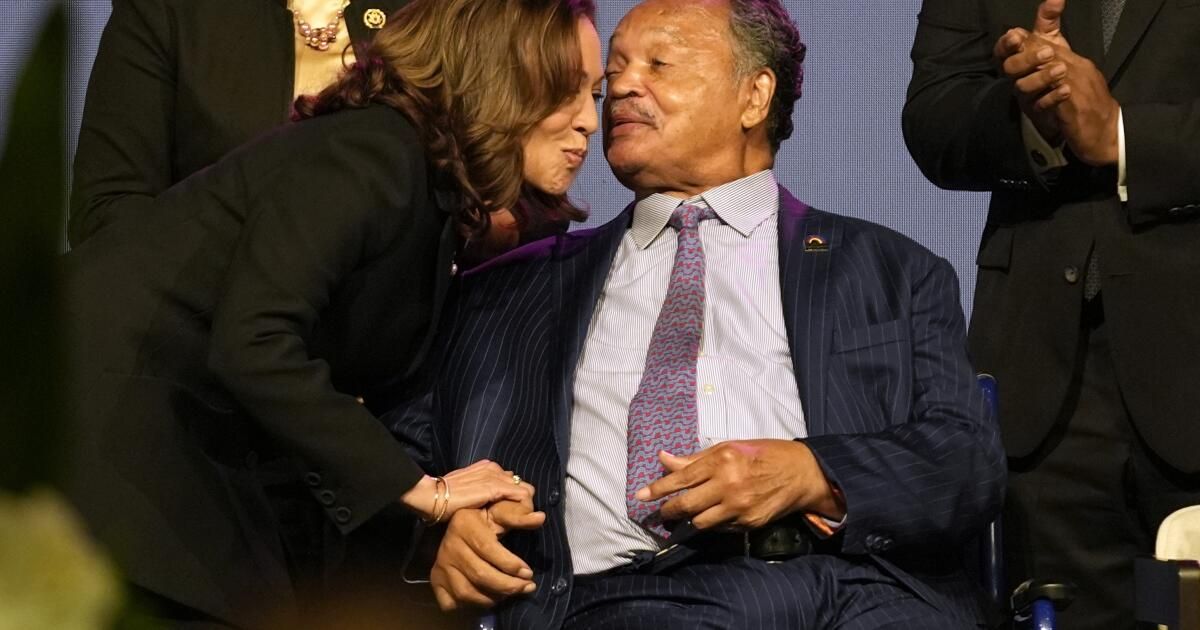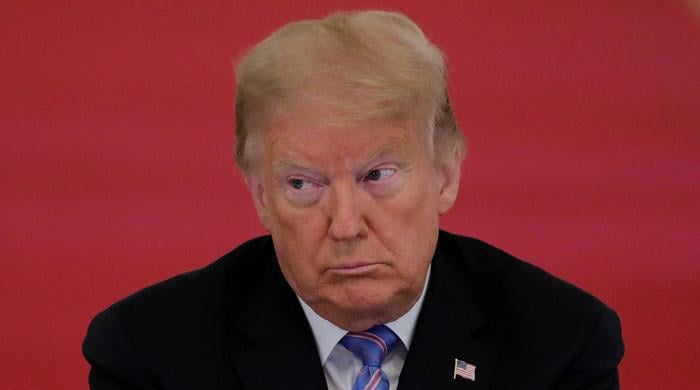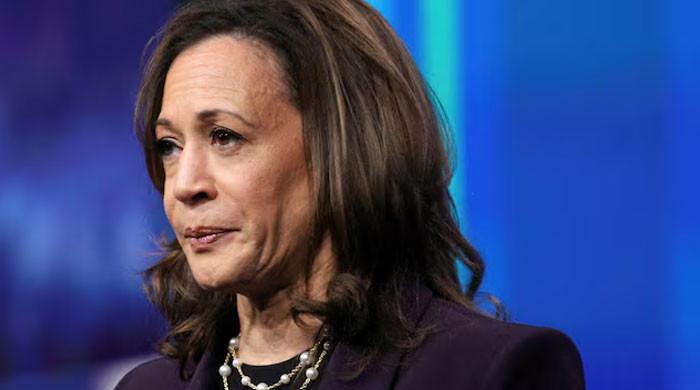The Democratic National Convention will mark many transitions, not the least of which will be the passing of the torch between generations.
This week, President Biden is effectively handing control of the party and the 2024 presidential nomination to Vice President Kamala Harris, an 81-year-old woman with decades of experience in public life who is ceding the national stage to her 59-year-old protégé.
On Sunday night, on a less prominent stage, the party’s most ardent progressives paused to recognize another leader and another transition: Several hundred people packed the auditorium at Rainbow PUSH headquarters to praise and affirm the Rev. Jesse L. Jackson.
Jackson is 82 and suffers from Parkinson's disease. A year ago, he appeared frail and spoke only a few words as he formally resigned as president of the organization he founded in the 1970s (PUSH stands for People United to Save Humanity) as a force for civil rights and economic equality.
Sitting in a wheelchair, Jackson joined the celebration Sunday night from the front of the auditorium, where he had so often cheered on supporters. For more than three hours, he was greeted by a steady stream of admirers who said they had been coached and inspired by him over the decades. All the while, prominent Democrats spoke from the stage.
From Sen. Bernie Sanders (I-Vt.) to Rep. Maxine Waters (D-Los Angeles) to the Rev. Al Sharpton to independent presidential candidate Cornel West, everyone agreed: Jackson and his work as a groundbreaking black presidential candidate in 1984 and 1988 seeded the political field for the eventual flourishing of other black leaders, including Harris.
Rep. Pramila Jayapal (D-Wash.) was the first of a half-dozen left-leaning House members who said their careers might not have happened without the inspiration of Jackson, who was born in Greenville, South Carolina, became a lieutenant to the Rev. Martin Luther King Jr. and launched his rights crusades in Chicago.
“He made sure that every person had a place to stand. Everybody was somebody,” Jayapal said, echoing Jackson’s signature refrain: “I am somebody.” She mentioned all the groups Jackson welcomed into his organization: multiple races, ethnicities, LGBTQ people, farmworkers and more. “And let’s not forget that civil rights and economic justice were deeply intertwined, and no one — no one — made that argument better than the Rev. Jesse Jackson.”
“We stand on your shoulders, Reverend Jesse Jackson,” Jayapal said to loud applause. “For every elected official we will see in that [convention] “In the scenario of the coming days, we are here on your shoulders. We are here because you showed us the way.”
The Nation, a venerable magazine of the American political left, sponsored the Jackson celebration. Editor and former publisher Katrina vanden Heuvel published a printed copy of the magazine's 1988 editorial supporting Jackson. She noted that he had been one of the first to advocate reducing the size of the U.S. military and diverting the savings to domestic programs. Vanden Heuvel called Jackson “a man of peace and a great citizen of the world.”
Many of those on stage, including Rep. Ro Khanna (D-Fremont), spoke of how they had followed Jackson since their youth, spurred to a life of public service by Jackson’s powerful speeches at the 1984 and 1988 Democratic conventions.
In 1988, Khanna recalled, Jackson had said he would not be content to be a small boat, cruising the waters in a safe harbor; he was determined to be on a big ship, on the open ocean of the world's great challenges, like apartheid in South Africa and economic injustice in the United States.
Jackson racked up more delegates in the 1988 contest than any other candidate except for Democratic candidate Michael Dukakis, the governor of Massachusetts, who would later suffer a resounding defeat to George H.W. Bush. Two opponents won fewer delegates than Jackson that year: then-Senator Joe Biden and future Vice President Al Gore.
Jackson's resonant oratory to delegates at that year's Democratic convention unfolded with the cadence and rhythm of his years as a Baptist preacher. No one listening to him that night at the Omni in Atlanta would have mistaken what they heard for a concession speech.
“I am tired of sailing my little boat, deep within the harbour bar,” he said near the end of his speech. “I want to go where the big ships float, to the depths where the big ones are. And if my frail craft proves too light for the waves that sweep those waves, I would rather plunge into the torturous struggle than sleep to death on the sheltered shore.”
“We have to go out, my friends, to where the big ships are.”
When Jackson concluded, bellowing “Keep hope alive!” once, twice… four times, the Democratic delegates were elated. Some cried.
In his speech, Sharpton described Jackson’s remarkable rise, “born in the Deep South, on the back of a bus, and growing into a world leader.” He credited Jackson with creating the language still spoken by progressives, particularly black leaders.
Some might say that Jackson, stricken with the disease, “can’t walk or talk like he used to,” Sharpton said.
The MSNBC commentator raised his voice and suggested that those people were wrong. “I want you to know that every time a black man opens his mouth and talks about hypocrisy, Jesse Jackson is talking!” he shouted as the crowd jumped to their feet. “Every time we march, Jesse Jackson is marching!”
Applause and shouts of affirmation drowned out Sharpton's conclusion. A video screen showed Jackson, a small smile playing on his lips.
More than 90 minutes later, the crowd had thinned. A moderator for The Nation hinted that Jackson might speak. All eyes turned to the front of the Rainbow PUSH auditorium and silence fell, but no words came out.
Shortly afterward, a platoon of Jackson's aides pushed his wheelchair to a waiting van, which drove slowly off into the Chicago night.












